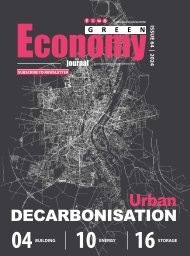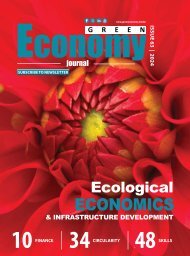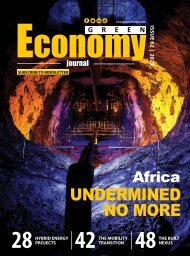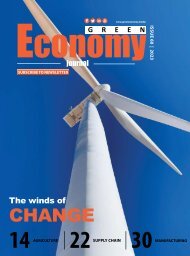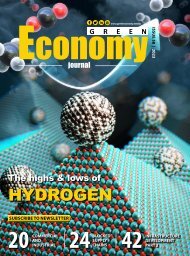Green Economy Journal Issue 61
Create successful ePaper yourself
Turn your PDF publications into a flip-book with our unique Google optimized e-Paper software.
CIRCULARITY<br />
CIRCULARITY<br />
WASTE NOT,<br />
WANT NOT<br />
The circular economy<br />
makes business sense<br />
The 2023 World Circular <strong>Economy</strong> Forum conference explored fresh thinking about protecting<br />
nature. Protecting the environment and our future are at the heart of every discussion. So is<br />
capitalism. One thing’s for sure: there’s plenty of money to be made in not wasting resources.<br />
BY GEORGINA CROUTH<br />
Without harvesting collective energies to drive this circular<br />
economy, Sitra (the Finnish Innovation Fund), Nordic<br />
Innovation and partners from around the world say they<br />
fear that within the next five years, biodiversity loss will become<br />
as big a political and economic issue as climate change is today.<br />
Sitra is a public foundation that operates directly under the<br />
supervision of the Finnish parliament. The foundation, which operates<br />
independently with the help of a healthy endowment, has reached<br />
the stage where investments in the circular economy have increased<br />
momentum and the government is wholeheartedly committed to<br />
the project.<br />
At first focused on problems in nature – pollution, the ozone layer,<br />
climate change – Sitra has now redirected its focus to nature loss and<br />
aims to encourage fresh thinking about the use of virgin resources<br />
and reducing the use of such dwindling resources in the system.<br />
Jyrki Katainen, the president of Sitra and former prime minister of<br />
Finland, told delegates at the plenary session that the private and<br />
public sectors have done a significant amount of work to address<br />
climate change.<br />
NEXT STEPS<br />
“We believe that this has paved the way for the next steps, where<br />
nature loss – biodiversity loss – is going to be learnt (experienced)<br />
faster than what was the case with climate change.”<br />
48<br />
Looking at what the world has been doing to address biodiversity loss<br />
in recent decades, the classic answer has been to set up conservation<br />
areas. That might be important, but it is simply not sufficient.<br />
If the world ever reaches the United Nations’ sustainability goals to<br />
protect 30% of our water and land areas, we should question what<br />
happens to the most important issue – the 70% that is not envisaged<br />
to be protected: the built environment, agricultural, forestry and other<br />
areas, he said.<br />
Within the next five<br />
years, biodiversity<br />
loss will become as<br />
big a political and<br />
economic issue<br />
as climate change<br />
is today.<br />
Article courtesy Daily Maverick<br />
It’s for this reason that the attention needs to be shifted to the circular<br />
economy: how the market economy can produce more efficiently, in<br />
harmony with nature.<br />
“Without answering or finding solutions to these questions, we cannot<br />
address biodiversity loss. This is where the circular economy comes<br />
in because it is a significant answer to addressing biodiversity loss.<br />
“The more we reuse resources that have already been extracted,<br />
the less we need to use raw virgin material, which is why businesses<br />
need to be encouraged to change their business model towards<br />
circularity,” said Katainen.<br />
André Küüsvek, the president and CEO of Nordic Investment Bank,<br />
said the bank had run programmes for years on circularity and the<br />
circular economy, to assist companies in adapting their business<br />
models. In their experience, many companies wanted to participate<br />
in the circular economy, but they still lacked the knowledge, insight<br />
and understanding of how it could be done.<br />
“Regulations are important, but a transformation to a sustainable<br />
future and to combat biodiversity loss cannot be done without industry<br />
adapting to this near future.”<br />
Küüsvek said 170 companies had participated in their programme<br />
for companies from all five Nordic countries to develop and implement<br />
a circular business model. It has been published in an open-source<br />
playbook to allow the rest of the world to see what and how it is being<br />
done in Scandinavia.<br />
LINEAR ECONOMY IS FAILING PEOPLE<br />
Valerie Hickey is the global director for environment, natural resources<br />
and the blue economy at the World Bank. She highlighted that we’re<br />
living in a world where primary resources are getting more scarce,<br />
overall goods and services are less affordable, and governments are<br />
in a debt crisis.<br />
“So, circularity is not just a nice-to-have. It’s an absolute must-have<br />
because, at the end of the day, it’s an efficiency and affordability agenda.”<br />
The World Bank, she said, is in the business of ending poverty and<br />
is committed to ending extreme poverty by 2030. But it is desperately<br />
failing at doing that.<br />
“We live in a world today where there are 828-million people who<br />
are going to go to bed hungry tonight. That number was 690-million<br />
people eight years ago. The numbers are getting worse, people are<br />
getting poorer, and our business is failing.”<br />
It’s because the linear economy is failing people and not delivering<br />
for everybody.<br />
“We’re in a doom and gloom loop that we have to get out of, and<br />
that’s the promise of a circular economy…”<br />
As Katainen pointed out, the circular economy is not about charity:<br />
it makes business sense from a purely capitalist perspective.<br />
49




